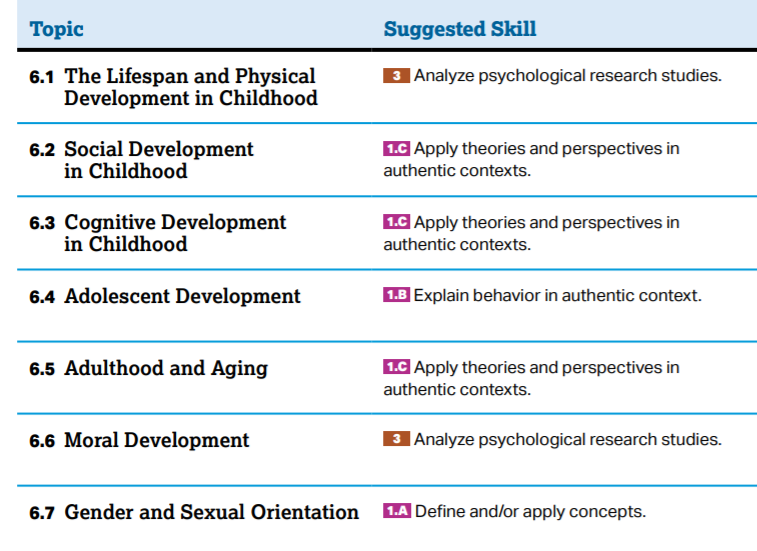Unit 6: Developmental Psychology
Lifespan Development

Developmental psychology deals with the behavior of organisms from conception to death and examines the processes that contribute to behavioral change throughout the life span . The major areas of emphasis in the course are prenatal development, motor development, socialization, cognitive development, adolescence, and adulthood .
AP students in psychology should be able to do the following:
• Discuss the interaction of nature and nurture (including cultural variations) in the determination of behavior .
• Explain the process of conception and gestation, including factors that influence successful fetal development (e .g ., nutrition, illness, substance abuse) .
• Discuss maturation of motor skills .
• Describe the influence of temperament and other social factors on attachment and appropriate socialization .
• Explain the maturation of cognitive abilities (e .g ., Piaget’s stages, information processing) .
• Compare and contrast models of moral development (e .g ., Kohlberg, Gilligan) .
• Discuss maturational challenges in adolescence, including related family conflicts .
• Explain how parenting styles influence development .
• Characterize the development of decisions related to intimacy as people mature .
• Predict the physical and cognitive changes that emerge as people age, including steps that can be taken to maximize function .
• Describe how sex and gender influence socialization and other aspects of development .
• Identify key contributors in developmental psychology (e .g ., Mar y Ainsworth, Albert Bandura, Diana Baumrind, Erik Erikson, Sigmund Freud, Carol Gilligan, Harry Harlow, Lawrence Kohlberg, Konrad Lorenz, Jean Piaget, Lev Vygotsky) .
Resources
The Developing Child - DISCOVERING PSYCHOLOGY
Maturing and Aging-DISCOVERING PSYCHOLOGY
The Growth of Knowledge: Crash Course Psychology #18
Monkeys and Morality: Crash Course Psychology #19
CrashCourse
Adolescence: Crash Course Psychology #20
